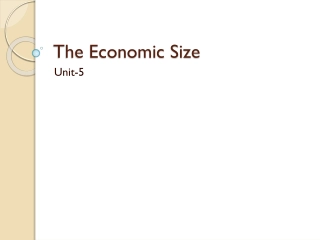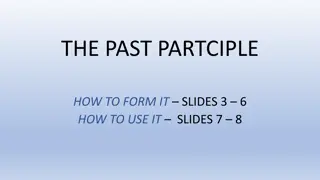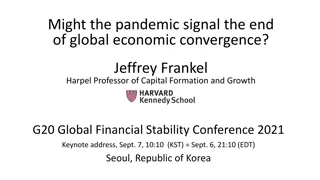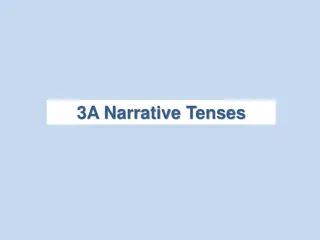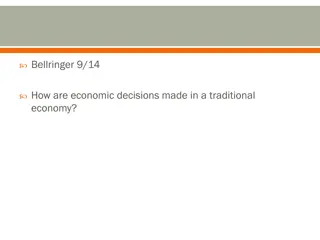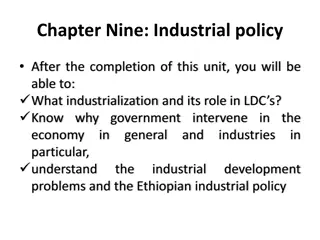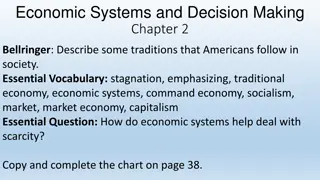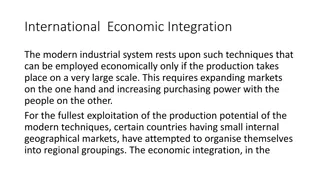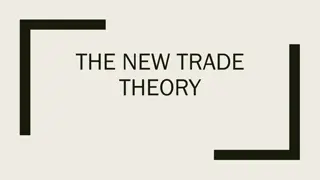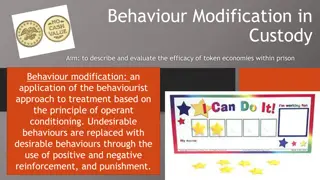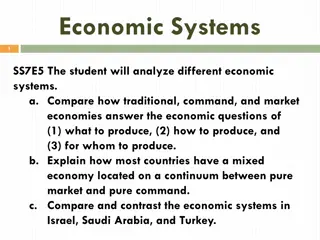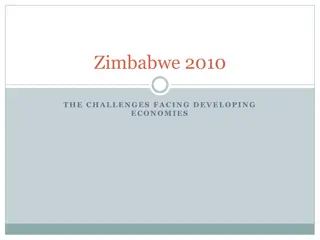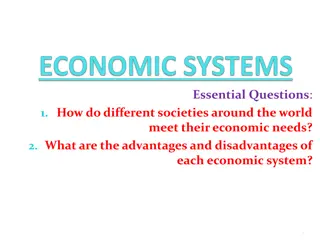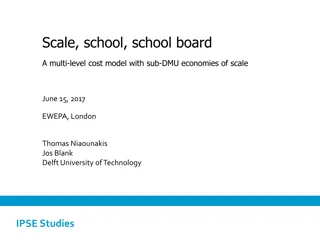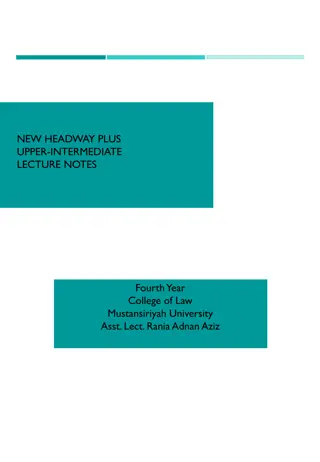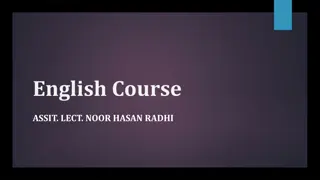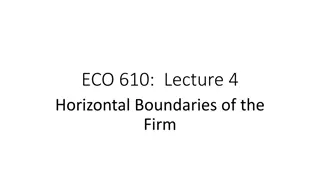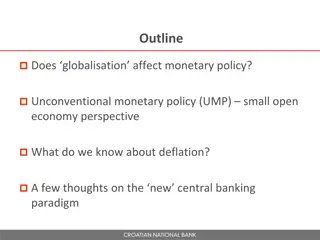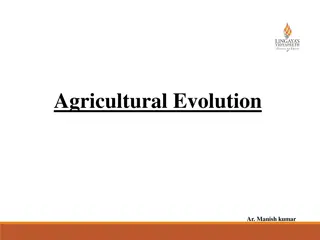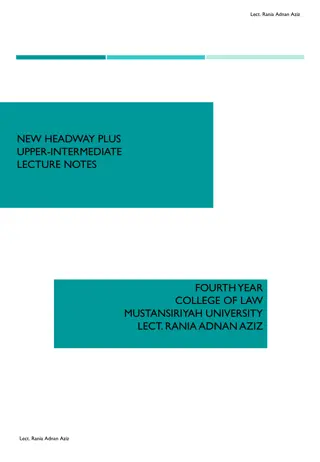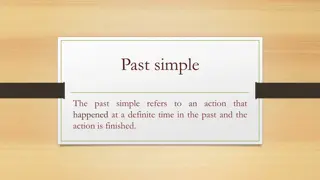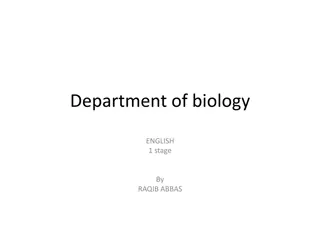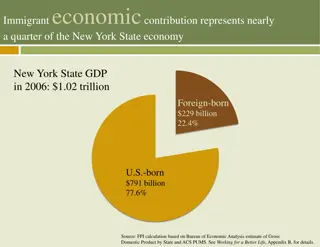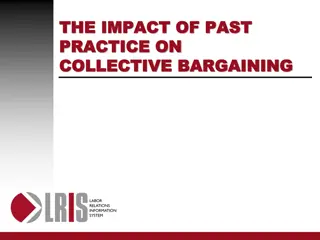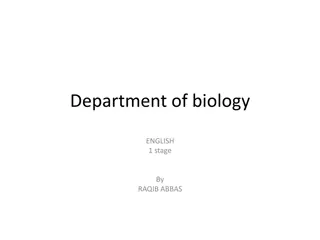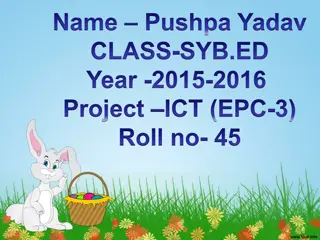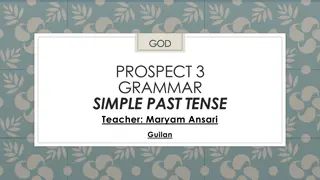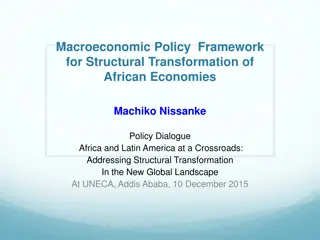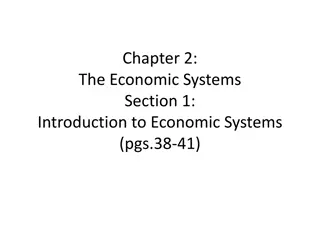The Economic Size
Economies of scale and how it can benefit businesses. Learn about the different types of economies of scale and their effects on production costs. Discover the sources that can help achieve economies of scale.
1 views • 21 slides
Understanding Shock Absorption and Fiscal Sustainability in Small Open Economies
This presentation delves into a model of output, prices, public finance, and balance of payments in small open economies. It explores the impact of macroeconomic shocks, fiscal sustainability restoration, and financial stability maintenance. The model sheds light on policy responses to varying econo
0 views • 30 slides
Learn Past Continuous Tense - Grade 6 English Lesson
This Grade 6 English lesson focuses on understanding and correctly using the past continuous tense. It covers the rules for forming the past continuous tense, examples of its usage, and an assessment to test comprehension. Students will practice talking about actions happening at specific times in t
4 views • 6 slides
Mastering the Past Participle in English Verbs
Understand how to form and use the past participle in English verbs, both regular and irregular. Learn the rules for forming regular past participles, including when to double consonants and when to change 'y' to 'i'. Discover examples of irregular verbs and how their past participles are formed. Ex
0 views • 8 slides
Understanding Global Economic Convergence Trends: Insights from Jeffrey Frankel’s Keynote at G20 Global Financial Stability Conference 2021
Jeffrey Frankel discussed the potential impact of the pandemic on global economic convergence at the G20 Global Financial Stability Conference 2021. Despite a resilient world economy in the first half of 2021, downside risks persist due to monetary and fiscal stimuli. The divergence between Emerging
1 views • 17 slides
Understanding Past Tenses in Narratives
Exploring the use of past simple, past continuous, past perfect, and past perfect continuous tenses in narratives with examples and explanations. Learn how to convey different past events and their relationships in storytelling.
1 views • 4 slides
Economic Systems in the United Kingdom, Germany, and Russia
Economic decisions in traditional economies are based on customs and beliefs. The United Kingdom has a mixed market economy with a focus on service industries, while Germany's economy is export-based. Russia's economy leans towards a command system. By comparing these economic systems, one can see h
0 views • 11 slides
Understanding Industrialization and Its Role in Developing Countries
Industrialization is defined as the process of economic development that mobilizes national resources to create a modern, diversified domestic sector capable of high growth. It plays a crucial role in transforming economies, creating job opportunities, and increasing income levels in developing coun
4 views • 26 slides
Understanding Economic Systems and Decision Making
The chapter delves into different economic systems such as traditional, command, and market economies, exploring how each handles scarcity and decision-making. It discusses traditions in American society, essential vocabulary, advantages, and disadvantages of traditional economies, and the impact of
0 views • 34 slides
Benefits of Economic Integration
Economic integration involves the unification of distinct economies into a larger economic region through the removal of trade barriers. It leads to economies of scale, international specialization, qualitative improvement in output, expansion of employment, and improvement in terms of trade. These
0 views • 33 slides
The New Trade Theory and Economies of Scale in International Trade
The New Trade Theory, emerged in the 1970s, challenges traditional trade theories by emphasizing the role of increasing returns and economies of scale in international trade. It introduces the concept of industrial organization and imperfect competition to explain how countries trade not only based
0 views • 12 slides
Token Economies and Behaviour Modification in Custody: Evaluating Efficacy
This article explores the application of token economies in prisons as a behaviour modification technique based on operant conditioning. Token economies involve exchanging tokens for desired behaviours, aiming to replace undesirable actions with positive reinforcement. The use of increments, consist
0 views • 19 slides
Understanding Economic Systems and Their Impacts
Explore traditional, command, and market economies, and how they address economic questions. Understand the concept of mixed economies and their placement on a continuum between market and command systems. Compare economic systems in Israel, Saudi Arabia, and Turkey. Delve into essential economic vo
0 views • 17 slides
Challenges Faced by Developing Economies in Post-Conflict Zones
Addressing the economic, social, and security challenges in developing economies post-conflict, including issues such as aid effectiveness, resource dependency, governance, and civil wars. The importance of foreign investment, multilateral cooperation, and possible solutions to foster economic growt
0 views • 20 slides
Understanding Community Wealth Building for Socially Just Economies
Community Wealth Building focuses on fairer, socially just economies through progressive concepts like anchor institutions, plural ownership, and fair labor markets. It promotes broad ownership and distribution of wealth for national and international benefits, including productivity, social, and en
0 views • 28 slides
Understanding Economic Systems and Their Impacts on Societies
Explore how different societies meet their economic needs through traditional, free enterprise, and communist economic systems. Learn about the advantages and disadvantages of each system, from the customs-based decisions in traditional economies to the government-controlled operations in communist
2 views • 17 slides
Economies of Scale in Dutch Primary Education: A Multi-level Cost Model
This paper explores economies of scale in Dutch primary education, focusing on school boards and school compositions. The study examines the impact of school size variations on cost determination at both levels, considering the challenges of limited input data availability. Different solutions are p
3 views • 16 slides
Understanding the Present Perfect Tense in English Grammar
The lecture notes explore the Present Perfect tense, highlighting its connection between past actions and their relevance in the present. It compares the Past and Present Perfect tenses, discussing the nuanced differences and providing examples for clarity. The document covers the usage of the Prese
0 views • 8 slides
Understanding the Past Perfect Tense in English Grammar
The Past Perfect Tense is used to talk about actions completed before a certain point in the past, emphasizing the sequence of events. This tense follows the structure of "had + past participle" and is crucial for expressing events that happened earlier than others in a narrative. Knowing how to for
0 views • 27 slides
Global Economic Update: High-income Economies Accelerating, Developing Countries Facing Challenges
The global economic outlook presents a contrast between high-income economies accelerating in growth while developing countries encounter challenges due to headwinds and capacity constraints. Key messages highlight the need for structural reforms to enhance outcomes. Risks include fallout from the s
4 views • 34 slides
Structuration Analysis of Central Government Accounting Practices and Reforms in Emerging Economies: A Study from Nepal
Delve into the nuances of central government accounting practices and reforms in emerging economies, focusing on Nepal. The study explores why key stakeholders resist externally-driven changes, investigates the unintended consequences of reforms, and highlights the role of organizational actors in s
0 views • 21 slides
Understanding Horizontal Boundaries of Firms in Economics
Exploring the concept of horizontal boundaries in firm behavior, this lecture delves into Long-run Average Cost curve, economies and diseconomies of scale, optimal plant size, and the Minimum Efficient Scale. It discusses how economies of scale affect production costs and the relationship between ma
0 views • 25 slides
Globalisation's Impact on Monetary Policy and Central Banking Paradigm
Globalisation has reshaped monetary policy dynamics, influencing inflation pressures and the transmission of shocks across economies. Unconventional monetary policies in small open economies have challenged conventional theories, highlighting the complexity of managing monetary conditions. The inter
0 views • 24 slides
Super Premium Sorbet Marketing Plan
Product Description: Super Premium Sorbet offering seven flavors including Chocolate, Cranberry Blueberry, Mango, Raspberry, Strawberry, Orchard Peach, and Zesty Lemon in a 14-ounce container. Marketed as part of the Haagen-Dazs portfolio, available in North America, Asia, South America, and Europe.
0 views • 16 slides
The Evolution from Paleolithic Societies to Agricultural Revolution
Exploring the transition from small Paleolithic societies relying on gathering and hunting to the Agricultural Revolution that brought deliberate cultivation of plants and animals. The shift marked a revolutionary transformation in human life, impacting economies, environments, spiritual beliefs, an
0 views • 12 slides
Understanding Simple Past Tense in English: Rules and Examples
The simple past tense is a fundamental form in Modern English used to describe past events. It involves regular verbs adding "-ed" and irregular verbs having different forms. The construction of the simple past helps distinguish it from other past tense forms like past perfect and past progressive.
0 views • 33 slides
Understanding Narrative Tenses: Past Simple, Present Perfect, and Past Continuous
Explore the nuances of narrative tenses through detailed lecture notes by Lecturer Rania Adnan Aziz. Learn the differences between Past Simple and Present Perfect, grasp the usage of Past Continuous, and understand the significance of Past Perfect in expressing past actions and timelines. Dive into
0 views • 6 slides
Understanding the Past Perfect Tense in English Grammar
The past perfect tense expresses actions that occurred before another action in the past, referring to time up to a point in the past. It is often used in reported speech and formal writing to indicate completed actions before a specific event. The past perfect progressive tense emphasizes the durat
0 views • 15 slides
Understanding Verb Tenses: Present Perfect and Past Perfect Forms
Explore the usage of present perfect and past perfect verb forms to indicate relationships of time and cause. Present perfect verbs denote actions with undefined past timing but relevance to the present, while past perfect verbs describe events that occurred before another past event. Examples and e
0 views • 7 slides
Understanding the Past Simple Tense in English Grammar
The past simple tense refers to actions that occurred at a specific time in the past and are now completed. This tense follows a specific rule where the subject is combined with a verb (regular or irregular) and a complement. Adverbs like "yesterday," "ago," and "last" are commonly used with past si
0 views • 9 slides
Understanding Past Simple Tense in English Grammar
The past simple tense is used to describe completed actions or events that happened at a specific time in the past. Regular verbs form the past simple by adding "-ed", while irregular verbs have unique past tense forms. The structure for negative and question forms involves the auxiliary verb "did".
0 views • 6 slides
Immigrant Contributions to the New York State and City Economies
Immigrants play a significant role in the economies of New York State and City, contributing nearly one-quarter and nearly half of their respective economic outputs. They represent a substantial share of the working-age population, labor force, and GDP. Immigrants work across various job sectors, fr
0 views • 20 slides
Understanding the Impact of Past Practices on Collective Bargaining
Exploring the significance of past practices in interpreting, supplementing, and potentially contradicting contract language within the context of collective bargaining. Covering topics such as the definition of past practices, the duty to bargain, waivers of protest rights, and remedies for unlawfu
0 views • 35 slides
Understanding Past Tenses in English for 3rd Year College Pharmacy Students
Dive into the intricacies of past tenses in English as you explore the nuances between past simple, past continuous, past perfect, and more. Test your grammar skills while learning to express events that occurred in the past, with a focus on practical application for students at Al-Mustansiriyah Uni
0 views • 25 slides
Understanding Past Perfect Tense in English Grammar
Past Perfect Tense is used to denote actions that were completed before another action occurred in the past. It is formed using the auxiliary verb "had" followed by a past participle. Examples of affirmative, negative, and question forms are provided to illustrate usage. The tense helps in sequencin
0 views • 4 slides
Common Regular Verbs and Their Past Tenses
Common regular verbs and their past tenses are essential aspects of grammar learning. Past tense forms of verbs are used to indicate actions or states that have already occurred. Examples of regular verbs and their corresponding past tenses are provided in this content, along with spelling rules for
0 views • 17 slides
Understanding Township Economies and Apartheid Border Industry Policies
Township economies consist of diverse enterprises predominantly characterized by informality and survivalist nature, with a significant number not lasting beyond 3 years. These economies have birthed successful black entrepreneurs, transitioning from serving exclusively the township market. On the o
0 views • 17 slides
Understanding Simple Past Tense in Grammar
In this file, we delve into the concept of simple past tense in grammar. Through examples and explanations, you will learn how to use the simple past tense to talk about completed actions in the past. The structure, usage, and importance of simple past tense are covered extensively to enhance your u
0 views • 30 slides
Macroeconomic Policy Framework for Structural Transformation of African Economies
Structural transformation is essential for the development of African economies, involving shifts towards higher productive activities and inclusive growth. The process requires purposeful efforts to create articulated economies with coordinated economic activities and positive externalities. Emphas
0 views • 13 slides
Understanding Different Economic Systems
Introduction to economic systems reveals how societies address scarcity by determining what to produce, how to produce, and for whom. Traditional, command, market, and mixed economies are explored, highlighting their distinct approaches. Traditional economies rely on customs, command economies are g
0 views • 9 slides
